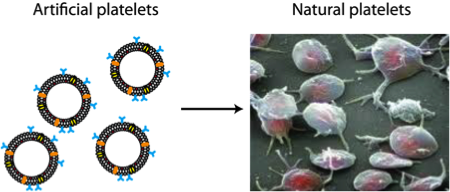 Platelets are the first cellular responder to injured vasculature, but it is constantly under shortage in the blood bank due to its short shelf life, susceptibility to contamination, and challenges in storage condition. Using biological components, we propose to build artificial platelets that mimic the functionalities of natural platelets. We envision such cellular devices will bring tremendous benefits in medical settings.
Platelets are the first cellular responder to injured vasculature, but it is constantly under shortage in the blood bank due to its short shelf life, susceptibility to contamination, and challenges in storage condition. Using biological components, we propose to build artificial platelets that mimic the functionalities of natural platelets. We envision such cellular devices will bring tremendous benefits in medical settings.
On September 13, Assistant Professor Allen Liu received the National Institute of Health (NIH) Director’s New Innovator’s Award for the proposed research. He is one of 50 investigators in the early stages of their careers to be honored with this year’s award. The purpose of this award is to “support exceptionally creative new investigators who propose highly innovative projects that have the potential for unusually high impact.”
The field of synthetic biology has recently emerged as a result of achieving a critical mass in our knowledge of biology. While many biological molecules and systems are still too complex to be rationally designed de novo, the continued efforts in isolation and characterization of individual biological components offer the possibility of integrating them into biologically inspired devices that exhibit novel functionalities. “Rather than deconstructing existing biological systems, my vision is to assemble biological parts into systems,” Liu said.
 The artificial platelets will be a vesicle-based platform and built from a novel combination of biological components that are well understood. They will be made to mimic natural platelets’ role in clotting cascade, with the primary challenge being the coupling of platelet adhesion to activation. By accepting the award, Liu is obligated to commit 25% of his research time to his proposal.
The artificial platelets will be a vesicle-based platform and built from a novel combination of biological components that are well understood. They will be made to mimic natural platelets’ role in clotting cascade, with the primary challenge being the coupling of platelet adhesion to activation. By accepting the award, Liu is obligated to commit 25% of his research time to his proposal.
